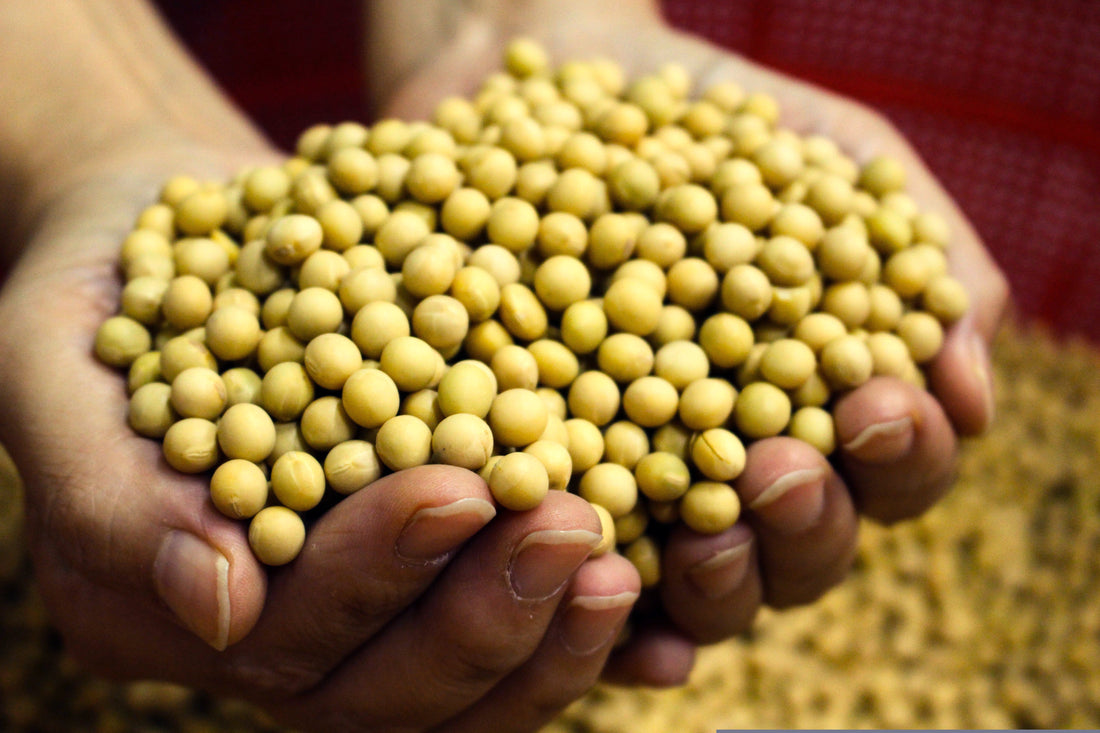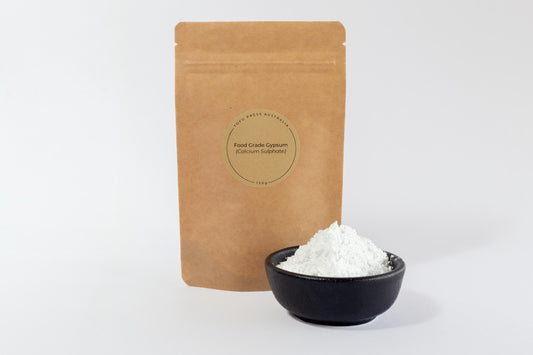
Is Tofu Good for You? Debunking the Most Common Myths About Soy
Tofu and soy have been part of traditional Asian diets for over 2,000 years, yet in Western culture they often spark fierce debate. You might have heard that 'Soy messes with your hormones' or 'Men shouldn’t eat soy' or 'Soy causes cancer'. These statements echo across the internet, with thousands of black-and-white, one-sided opinions describing the different ways soy is going to ruin your life — but is it really that bad?
To answer that question, we’ve combed through the most relevant scientific research to seek answers… and the result? No – unless you are allergic, soy is not the bad guy that it is often made out to be. But first, we need to clear the air. This article is here to debunk the most common tofu and soy myths so you can make informed choices without fear or confusion.
Myth 1: Tofu Messes With Your Hormones
Tofu contains isoflavones, which are a type of plant compound known as phytoestrogens. These compounds can bind to estrogen receptors in the body but they do not function in the same way as human estrogen.
Some people worry that eating tofu will 'feminise' the body or disrupt hormonal balance. This concern often stems from misunderstandings or exaggerated media headlines.
Multiple studies have found that soy has no significant effect on oestrogen or testosterone levels in humans. Traditional cultures that consume soy daily — such as Japan and China — have some of the lowest rates of hormone-related illnesses, including breast and prostate cancer. This study suggests that 'increases in the incidence of hormone-dependent cancers in Asian countries such as Japan are because of the current trend in these countries of abandoning the traditional soy-rich diet in favour of more Westernised foods'.
For women going through menopause, tofu may even offer benefits. Isoflavones can mildly mimic estrogen, which may help relieve symptoms like hot flushes and night sweats.
As with most things, soy provides the most benefits when consumed in moderation. There is some evidence to suggest that consuming 7-18+ servings of soy daily may neutralise its benefits and raise circulating IGF-1 to levels comparable to those who eat meat (high levels of insulin-like growth factor 1 are associated with increased risk of prostate cancer). However, this may be negated by the anti-cancer effects of soy isoflavones. Either way, consuming 7-18 servings of soy a day is rather extreme and eating anything in this quantity is likely to have some kind of health ramifications.
✅ Verdict: Tofu does not mess with your hormones if consumed as part of a balanced diet. It may even help regulate them in a healthy way.
Myth 2: Men Should Avoid Tofu Because It Lowers Testosterone
The idea that tofu or soy foods reduce testosterone in men has been widely circulated but is not supported by science. In fact, two major reviews of the research have shown the opposite.
A meta-analysis evaluated 15 placebo-controlled studies and found no significant effects of soy protein or isoflavones on testosterone, free testosterone, sex hormone-binding globulin (SHBG) or the free androgen index in men. This means eating tofu or other soy foods doesn’t reduce levels of circulating or bioavailable testosterone — the hormone most often linked to masculinity and libido — in any statistically significant way.
Another review looked even deeper and confirmed that isoflavone exposure does not have feminising effects in men — even at levels much higher than a typical diet. There was also no evidence that soy affects sperm health or sexual function, and concerns from rodent studies don’t apply to humans due to key metabolic differences.
✅ Verdict: Tofu and soy foods do not lower testosterone or impair male health. Men can eat tofu and soy confidently in moderation without worrying about hormone disruption.
Myth 3: Soy Increases Breast Cancer Risk
One of the most common fears around tofu and soy is that they may raise the risk of breast cancer due to their phytoestrogen content. However, current research suggests the opposite — that soy foods like tofu may play a protective role.
A meta-analysis of 18 studies found that higher soy intake is linked to a lower risk of breast cancer. This inverse association was seen in both oestrogen receptor-positive and oestrogen receptor-negative cancers, meaning the benefits appear to extend regardless of hormone receptor status. The protective effect was especially strong in premenopausal women.
While more long-term research is needed, these findings strongly suggest that soy foods are safe for women and may even support breast health. Importantly, this research focuses on whole soy foods like tofu, not ultra-processed soy supplements and protein isolates.
✅ Verdict: Eating tofu or soy does not increase breast cancer risk. On the contrary, regular soy intake may actually help reduce the risk for many women.
Myth 4: Tofu Is Highly Processed and Unnatural
Tofu is a minimally processed food and has been made using very basic methods for over 2000 years. It’s made by curdling soy milk (from whole soybeans) and pressing it into a block — similar to how cheese is made. The ingredients are very basic – just soybeans, water and a natural coagulant like magnesium chloride or calcium sulphate. You can see how to make it here.
This is very different from ultra-processed soy products like soy protein isolate or artificial meat alternatives that often contain dozens of additives.
When you choose tofu, especially organic or non-GMO varieties, you’re eating a whole food that has been consumed safely for thousands of years.
✅ Verdict: Tofu is a clean whole food — not a heavily processed one.
Myth 5: Soy Disrupts Thyroid Function
Some people worry that soy foods like tofu can harm thyroid function, particularly because soy contains isoflavones that interact with hormones. However, the evidence shows that for most people — especially those with adequate iodine intake — soy is safe and does not negatively impact thyroid health.
A comprehensive review of 14 clinical trials involving healthy men and women found little evidence that soy foods or isoflavones affect thyroid function in people with normal thyroids and sufficient iodine intake. Only one study showed notable changes — and even then, the effects were modest.
For those with hypothyroidism, the main concern is not soy itself but its potential to slightly reduce absorption of thyroid medication like levothyroxine. This is easy to manage by taking medication and soy foods several hours apart— just like you would with coffee, calcium or iron supplements. There is also a theoretical concern (based on animal and lab studies) that soy might increase the risk of hypothyroidism if iodine intake is low or thyroid function is already impaired. However, this can be remedied by ensuring an adequate iodine intake.
✅ Verdict: Soy does not harm thyroid health in people with adequate iodine intake. If you're taking thyroid medication, just separate it from soy meals — and as always, make sure you're getting enough iodine.
Myth 6: All Soy Is Genetically Modified
While it’s true that much of the soy grown globally is genetically modified (GMO), most of that goes to animal feed, not human food. In fact, 77% of soy grown is used to feed livestock! You can read more about the sustainability of tofu here.
In Australia, soy is not grown as a GMO crop; however, imported GMO beans are available on supermarket shelves. Luckily, non-GMO organic tofu is widely available, as are biodynamic and organic soybeans, thanks to growers such as Slater Farms.
GMO crops are engineered to withstand higher rates of herbicides and pesticides, such as glyphosate. In terms of health, this is the main reason to avoid GMO products. Some other concerns include the creation of herbicide-resistant weeds and the consumption of modified genes.
✅ Verdict: You can easily avoid GMO soy by choosing organic tofu and soybeans.
The Bigger Picture: Cultural Bias and Soy Fear
Many of the fears around tofu and soy stem not from science but from cultural bias. Traditional Western diets are heavily meat-based, so plant proteins are often viewed with suspicion. But in countries like Japan and Korea, soy is a central part of daily life — and these cultures enjoy lower rates of chronic diseases and longer life expectancy.
It’s important to recognise where these myths come from. Often, they’re repeated by industries that benefit from people eating more meat or dairy — or by influencers trying to sell alternative supplements and fear-based wellness solutions.
Science tells a different story. When eaten in moderation as part of a balanced whole food diet, tofu is not only safe — it’s genuinely good for you.
Final Thoughts: Is Tofu Good for You?
Yes — tofu is absolutely good for you. It’s packed with plant-based protein, healthy fats and is rich in minerals and protective compounds like isoflavones. But beyond the nutrition, it’s helpful to let go of outdated fears and look at the bigger picture. Challenging the myths around tofu isn’t about defending one food — it’s about creating more space for sustainable, balanced and inclusive ways of eating.
If you enjoy tofu, there’s no reason not to include it regularly. And if you’ve avoided it because of old concerns, it might be time to take a fresh look!
'Other than allergic reactions, there is almost no credible evidence to suggest traditional soyfoods exert clinically relevant adverse effects in healthy individuals when consumed in amounts consistent with Asian intake.' - Mark Messina, Insights gained from 20 years of soy research
Want to take the next step? Learn how to make your own tofu at home!
Disclaimer: This article is for general informational purposes only and does not constitute medical or dietary advice. Always consult a qualified healthcare professional before making significant changes to your diet, especially if you have existing health conditions or concerns related to thyroid function, hormone balance or nutrition.
Sources Cited:
Phytoestrogen Concentrations in Serum from Japanese Men and Women over Forty Years of Age



